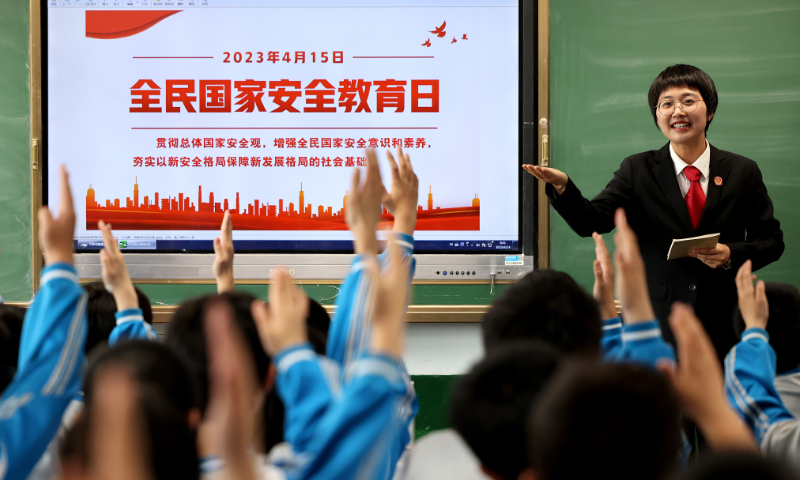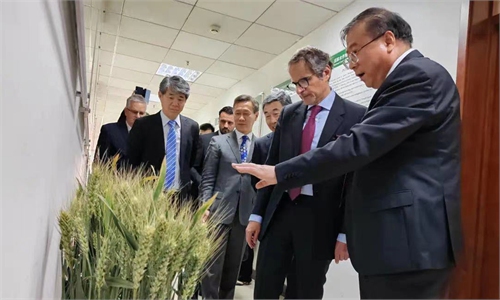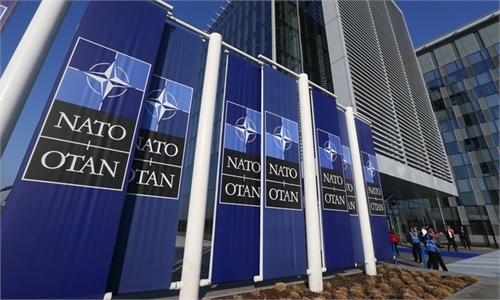
A judge explains the National Security Law to the students at Zaozhuang No. 41 Middle School in Shandong Province on April 14, 2023. Photo: VCG
Chinese President Xi Jinping on Tuesday called for accelerated efforts to modernize the country's national security system and capacity.
Xi, also general secretary of the Communist Party of China (CPC) Central Committee and chairman of the Central Military Commission, made the remarks as he chaired the first meeting of the National Security Commission under the 20th CPC Central Committee. Xi heads the commission.
Xi called for staying keenly aware of the complicated and challenging circumstances facing national security and correctly grasping major national security issues.
He urged efforts to safeguard China's new pattern of development with a new security architecture and break new ground on national security work.
The national security issues China faces today are "considerably more complex and much more difficult to be resolved," said the meeting. It stressed the necessity of being prepared to deal with worst-case and extreme-case scenarios and being ready to withstand "high winds, choppy waters, and even dangerous storms."
"The meeting has made a very important point in safeguarding China's new pattern of development with a new security architecture as the country faces prominent challenges," Li Wei, an expert on national security at the China Institute of Contemporary International Relations, told the Global Times.
There are challenges stemmed from both international and regional conflicts, terrorism and those brought by unilateral and trade protectionism, Li noted. Mindset to deal with worst-case and extreme-case scenarios should be applied in addressing affairs related to the South China Sea and the Taiwan question, Li noted.
As for how to safeguard China's new pattern of development with a new security architecture, Li believes the meeting has given a clear answer as it called for taking the initiative to shape a favorable external security environment for China to better safeguard its opening-up and push for a deep integration of development and security.
Li said since the 20th National Congress of the Communist Party of China (CPC) there have been innovative adjustments to China's diplomacy.
While Western countries have been trying to provoke tensions relating to the Ukrainian crisis, what China has done is to promote peace across the globe. China, for example, has been playing an important role in prompting diplomatic reconciliation between Saudi Arabia and Iran, two bitter rivals in the Middle East, Li noted.
While the US has imposed sanctions on key core technologies and pushed for economic decoupling with China, China is still maintaining a normal economic and trade network with many countries and also making its own contribution to the international and global economy, the expert noted.
This meeting urged dedicated efforts to safeguard political security and improve the security governance of internet data and artificial intelligence. Furthermore, it called for expedited endeavors to establish a risk monitoring and early warning system.
The meeting adopted a document on speeding up building a national security risk monitoring and early warning system and another one on strengthening public communication regarding national security.
The monitoring and early warning systems for national security risks involves fields such as financial security, energy security and military security, both traditional and non-traditional, Chinese observers noted. With the monitoring and early warning systems, China is able to achieve real-time monitoring and security evaluation so as to enhance capability to safeguard the overall national security, said the experts.
On strengthening national security education, Li said national security should be a notion that's deeply rooted in the mind of every Chinese citizen. Though the country has set April 15 as the national security education day, the subject should be more integrated in the daily lives of all Chinese people, for example, be included in students' text books, he said.



